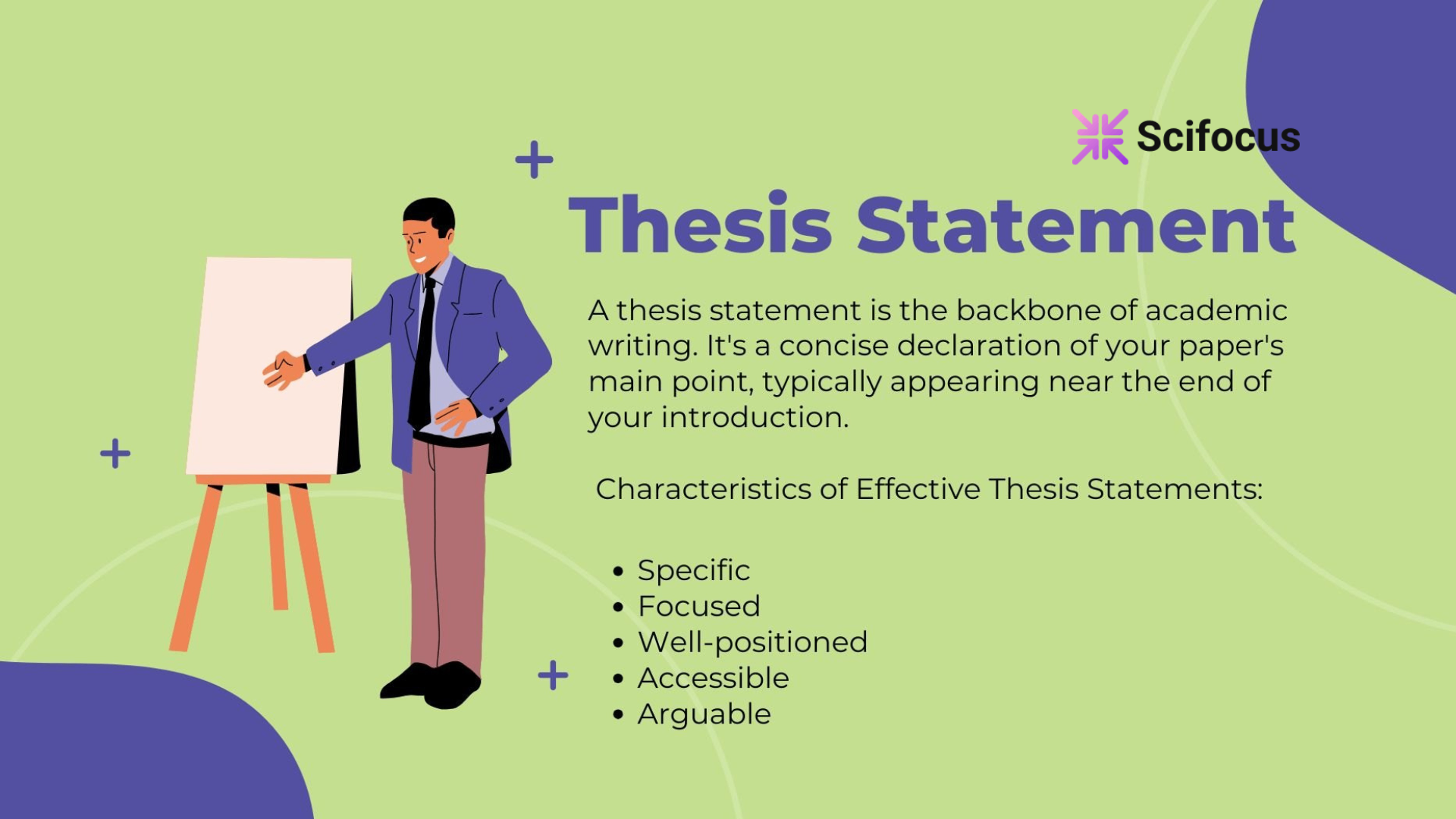What Is a Thesis Statement and How to Write One?

Research from the University of Pittsburgh analyzing student writing found a shocking trend: approximately 50% of student essays lack a clear, identifiable thesis statement. That means half of the papers submitted failed before the argument even began because the writer didn't plant a flag in the ground.
So, what is a thesis statement? And more importantly, how do you write a thesis statement that ensures you end up in the top half of that statistic? This guide will break down the thesis statement meaning, integrate authoritative data on why it matters for your GPA, and provide a step-by-step framework to write one.
If you are navigating a complex assignment and need immediate structural help, platforms like Scifocus are designed to streamline this exact process.
What Is a Thesis Statement?
A thesis statement is the intellectual anchor of your paper. It is a single sentence (or two) located at the end of your introduction that tells the reader exactly what you are arguing and how you intend to prove it.
The University of North Carolina at Chapel Hill Writing Center describes the thesis as a Road Map. It tells the reader where you are going and how you will get there. Without it, your essay is just a collection of paragraphs that don't talk to each other.
But it is more than just a map; it is a stance. A valid thesis must be debatable.
- Fact (Not a Thesis): "The Great Depression began in 1929." (No one argues this).
- Thesis: "The economic collapse of 1929 was inevitable due to unregulated stock market speculation and a fragile banking system." (This is an argument).
Does a Good Thesis Actually Impact Grades?
Yes, a good thesis will absolutely impact your grades.
Writing a thesis isn't just an arbitrary rule professors invented to annoy you. It correlates directly with performance. Research published in the Journal of Writing Research found a statistically significant link between a "deep and organized approach" to thesis writing and final grades. Students who mastered this structure had a **mean grade of 3.96 (out of 5)**, while those with "unreflective" approaches scored significantly lower.
Furthermore, a meta-analysis by the U.S. Department of Education indicates that explicit instruction on structuring arguments has a moderate to large positive effect size (0.31 to 0.59) on writing quality. This means writing a good thesis isn't a talent you are born with; it is a mechanical skill you can learn.
Thesis Statement Parts
To understand how to make a thesis statement, you need the formula. A strong thesis statement format usually looks like this:

- Subject: What are you talking about? (e.g., Remote Learning)
- Claim: What is your specific stance? (e.g., is detrimental to social development)
- Rationale: Why is this true? (e.g., due to isolation and lack of peer modeling)
Put it together:
"While remote learning offers schedule flexibility, it is detrimental to the social development of adolescents because it eliminates the peer modeling and spontaneous interactions necessary for emotional growth."
If you are struggling to plug your ideas into this formula, you can use the Scifocus thesis statement generator. By logging in, you can access tools that help you structure these distinct parts into a cohesive argument.
How to Write a Thesis Statement
Writing is a process of refinement. You rarely get it right on the first try.
Step 1: Start with a Question
If your assignment is about the environment, ask: "Is a carbon tax effective?"
Step 2: Write a "Working Thesis"
Draft a messy answer. "I think carbon taxes work because they make companies pay for pollution."
According to the Harvard College Writing Center, moving from a Working Thesis to a Final Thesis is the most critical part of the process. Your first draft is just a placeholder.
Step 3: Narrow Your Focus (The Hard Part)
This is where most students fail. A study from CUNY Academic Works found that while 40% of students improved their writing with practice, 13.3% showed minimal improvement specifically because they struggled to narrow their focus.
- Too Broad: "Pollution is bad for the world." (You cannot prove this in 5 pages).
- Narrowed: "Municipal plastic bans in coastal cities have significantly reduced marine debris, though they fail to address the root cause of industrial waste."
Step 4: Watch Your Verbs
A study analyzing errors in student theses found that 24.5% of mistakes were related to verb use. Students often rely on weak, passive verbs like "is," "has," or "shows."
- Weak: "The author says that racism is bad."
- Strong: "The author critiques institutional racism and challenges the reader's complicity."
How long is a thesis statement?
The short answer is one to two sentences. The long answer is that it should be exactly as long as necessary to convey your argument—and not a word more. A thesis statement is a distillation of your entire paper, not a summary of it. If you find yourself writing a three or four-sentence block, you are likely drifting into providing evidence rather than stating your claim. A concise thesis forces you to be precise; if your argument is too complex to fit into two sentences, your topic may be too broad for a single paper. Remember, the thesis is the anchor, not the whole ship—keep it punchy, direct, and impossible to misunderstand.
Thesis Statement Examples for Essays
Different assignments require different tones. The Purdue OWL (Online Writing Lab) —often considered the Gold Standard for academic definitions—categorizes them into three main buckets.
1. Argumentative Thesis Statement
You are convincing the reader of a specific point.
- "The death penalty should be abolished because it is applied disproportionately to minorities and does not deter violent crime."
2. Analytical Thesis Statement
You are breaking down a complex issue or text.
- "Hemingway’s use of truncated sentences in 'The Old Man and the Sea' reflects the protagonist’s stoic resilience against the forces of nature."
3. Expository Thesis Statement
You are explaining a concept to the reader.
- "The primary drivers of the 2008 financial crisis were predatory lending practices and the deregulation of derivatives markets."
Where Is the Thesis Statement Located?
In 99% of academic papers, the thesis statement in essay writing is located at the end of the introduction.
Think of your introduction as a funnel. You start wide (the hook), provide context (background info), and narrow down to your specific point (the thesis). If you bury your thesis in the middle of the third paragraph, your professor might miss it—and as the data shows, a missing thesis is the fastest way to lower your grade.
Common Mistakes to Avoid
The "Mystery Novel" Approach
Do not save your main argument for the conclusion. Academic writing is not a suspense movie. Give the reader the answer upfront so they can evaluate your evidence as they read.
The "I Think" Trap
Avoid phrases like "In my opinion" or "I believe." They weaken your authority. If you write "The sky is blue," it is a fact. If you write "I think the sky is blue," it sounds like you are unsure.
The List
Avoid merely listing topics. "The Civil War was about slavery, economics, and states' rights." This is a table of contents, not an argument. Try to synthesize: "The Civil War was an inevitable conflict driven by the economic and moral incompatibility of slavery with Northern industrialism."
Conclusion
Mastering how to write a good thesis statement is the single most effective way to improve your academic writing. It forces you to clarify your thoughts before you even start the body paragraphs.
Remember the data: explicit instruction and a deep approach to structure can significantly boost your grades. So, take the time to refine that one sentence. Make it debatable. Make it specific.
If you want to test your current thesis or need help generating a strong starting point, you can start a free trial with SciFocus today.
Further Reading for Academic Success
Once you have your thesis locked in, the rest of your paper needs to meet the same high standards. Check out these guides to perfect your essay from start to finish:
- Finish Strong: The thesis starts the argument, but the conclusion must seal the deal. Learn how to write a thesis conclusion that leaves a lasting impact.
- Master Mechanics: Punctuation can change the meaning of your argument. Make sure you know when to use single quotation marks versus double ones.
- Cite Correctly: A great argument is nothing without evidence. If you are referencing textbooks or anthologies, here is a guide on how to cite a chapter in a book in APA format.
FAQ: Frequently Asked Questions
Can a thesis statement be a question?
No. A thesis is an answer to a question. If you ask "Why did Rome fall?", that is a topic. Your thesis must be the claim: "Rome fell due to political corruption and over-expansion."
What is a 'working thesis'?
A working thesis is your rough draft. It is a temporary statement that guides your research. As you find more evidence, your opinion might change, and that is okay! You should revise your thesis statement meaning to match your final conclusion.
Is a thesis statement the same for a research paper and an essay?
Structurally, yes. However, a thesis statement for research paper assignments (especially in sciences) often frames a hypothesis or expected result, whereas a humanities essay focuses on persuasion or literary analysis.
Can I use a thesis statement checker?
Yes, tools can be helpful for structure. The thesis statement generator available when you log in to Scifocus is excellent for ensuring you have all the necessary parts (Subject + Claim + Rationale).
Did you like this article? Explore a few more related posts.
Start Your Research Journey With Scifocus Today
Create your free Scifocus account today and take your research to the next level. Experience the difference firsthand—your journey to academic excellence starts here.
